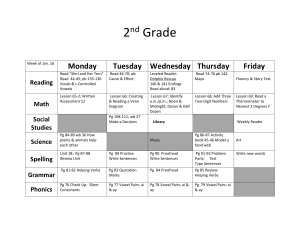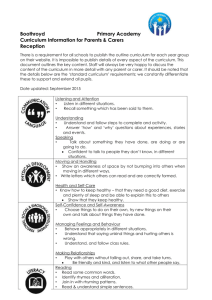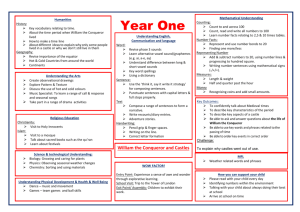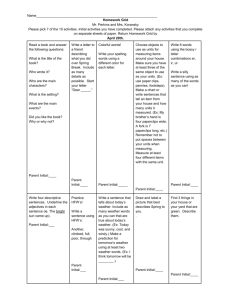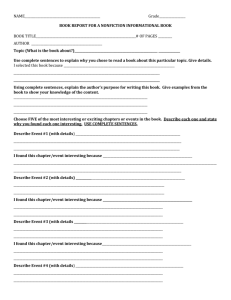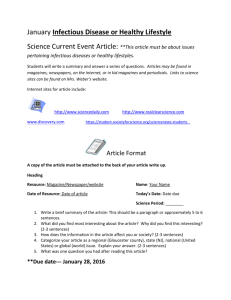week19 of 36
advertisement
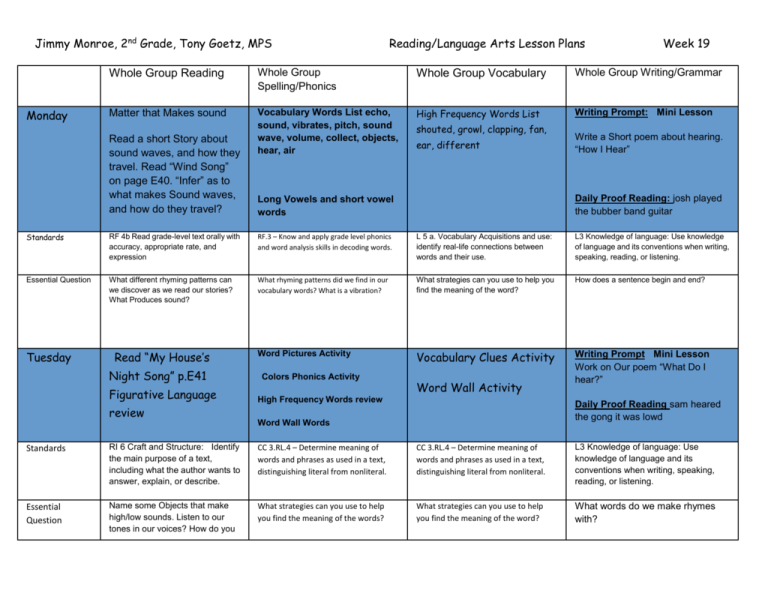
Jimmy Monroe, 2nd Grade, Tony Goetz, MPS Monday Reading/Language Arts Lesson Plans Week 19 Whole Group Reading Whole Group Spelling/Phonics Whole Group Vocabulary Whole Group Writing/Grammar Matter that Makes sound Vocabulary Words List echo, sound, vibrates, pitch, sound wave, volume, collect, objects, hear, air High Frequency Words List Writing Prompt: Mini Lesson Read a short Story about sound waves, and how they travel. Read “Wind Song” on page E40. “Infer” as to what makes Sound waves, and how do they travel? shouted, growl, clapping, fan, ear, different Write a Short poem about hearing. “How I Hear” Daily Proof Reading: josh played the bubber band guitar Long Vowels and short vowel words Standards RF 4b Read grade-level text orally with accuracy, appropriate rate, and expression RF.3 – Know and apply grade level phonics and word analysis skills in decoding words. L 5 a. Vocabulary Acquisitions and use: identify real-life connections between words and their use. L3 Knowledge of language: Use knowledge of language and its conventions when writing, speaking, reading, or listening. Essential Question What different rhyming patterns can we discover as we read our stories? What Produces sound? What rhyming patterns did we find in our vocabulary words? What is a vibration? What strategies can you use to help you find the meaning of the word? How does a sentence begin and end? Word Pictures Activity Vocabulary Clues Activity Writing Prompt Mini Lesson Work on Our poem “What Do I hear?” Tuesday Read “My House’s Night Song” p.E41 Figurative Language review Colors Phonics Activity Word Wall Activity High Frequency Words review Daily Proof Reading sam heared the gong it was lowd Word Wall Words Standards RI 6 Craft and Structure: Identify the main purpose of a text, including what the author wants to answer, explain, or describe. CC 3.RL.4 – Determine meaning of words and phrases as used in a text, distinguishing literal from nonliteral. CC 3.RL.4 – Determine meaning of words and phrases as used in a text, distinguishing literal from nonliteral. L3 Knowledge of language: Use knowledge of language and its conventions when writing, speaking, reading, or listening. Essential Question Name some Objects that make high/low sounds. Listen to our tones in our voices? How do you What strategies can you use to help you find the meaning of the words? What strategies can you use to help you find the meaning of the word? What words do we make rhymes with? make pitch higher or lower? Wednesday Read a book about Sound Waves…. Read Word Blanks activity Review HFW list Vocabulary List Activity Writing Prompt Write about the inference activity, Daily Proof Reading does richard play the drummms “Wind Song”. “Infer” activity Describe sound waves and give characteristics. Standards RF 4b Read grade-level text orally with accuracy, appropriate rate, and expression RF.3 – Know and apply grade level phonics and word analysis skills in decoding words. CC 3.RL.4 – Determine meaning of words and phrases as used in a te xt, distinguishing literal from nonliteral. L3 Knowledge of language: Use knowledge of language and its conventions when writing, speaking, reading, or listening. Essential Question How does an object change its What are some synonyms to our words? What strategies can you use to help you find the meaning of the word? How many sentences make a paragraph? Word List Activity Word Wall Activities Vocabulary Question Activity Writing Mini Lesson Write a word that helps describe a sound ex. Boom, crunch, bang, and pop pitch or volume using different columns of air? What part of the body sends and receives sound? Thursday Sound Waves Activity Sound-Word Sentences Review HFW list for test Daily Proof Reading did you heer that noice Standard Essential Question 2P1.2 Summarize the relationship between sound and objects of the body. How can we use our words In context? What strategies can you use to help you find the meaning of the word? What words do we use to persuade readers? Friday Sound Waves---Pitch and Volume What’s the difference? What part of the body do we use to send and receive sound? How do we make noise? Word Study Assessment High Frequency Assessment* Word Study Pictures Writing Prompt: Writing how we read, With expression and volume Daily Proof Reading do you hear what i hear Vocabulary Quiz Turn in Reading log Standards 2RL 5 Ask and respond to questions L3 Knowledge of language: Use knowledge of language and its conventions when writing, speaking, reading, or listening. What revisions will help improve our writing? Essential Question Jimmy Monroe 2nd Grade, Tony Goetz, MPS Math, Small Group, and Literacy Stations Monday Math Literacy Stations Small Group Plans 4.1 Change-to-More Literacy Stations –Students rotate through stations. Isabella and Piper- List B, Kadence Diphthongs, Jaycee S.,Colby, Chance and Jayden Rand L controlled vowels, Everyone on List C Reading: Number Stories Multiplication Tables practice L F Testing Standards 2.OC.2-Guide children as they solve change to more number stories. Below: High Frequency List B and C words, On level: High Frequency C and Story Elements, Multisyllabic Words Advanced: Story Elements and Comprehension Notes: Lunch 11:40 – 12:05 Recess 12:05 – 12:30 Essential Question Can my students recognize words to help determine whether they add or subtract? What can they do differently? Tuesday 4.1 Change-to-More Number Stories Multiplication Tables practice Standards Literacy Stations –Students rotate through stations. Teacher will assess comprehension. MIRP daily 1:00 - 1:30 Computer Lab 11:00 - 11:30 daily 2.OC.2-Guide children as they solve change -to- more number stories. Can my students recognize words to help determine whether they add or subtract? What can they do differently? Wednesday 4.2 Parts-and-Total Reading Comp. Assessment Number Stories Formative: Observations Multiplication Tables practice Standards Science – Spiders: Fact/Opinion Exit Question 2.0A.2 Guide children as they solve parts- and-total number stories. Essential Question How can you solve multidigit addition problems differently? Thursday 4.2 Parts-and-Total Number Stories Multi. Tables practice Standards 2.0A.2 Guide children as they solve parts- and-total number stories. Globe, Maps, Community Weekly Reader Essential Question How can you solve multidigit addition problems differently? Friday 4.2 Parts-and-Total Number Stories Multi. Tables practice Reading Comp. Assessment Weekly Reader Formative: Observations, Exit Question January Summative: Spelling/Reading Test Standards 2.0A.2 Guide children as they solve parts- and-total number stories. Essential Question How can you solve multidigit addition problems differently? Task Board -After students have finished their whole group lesson, they follow the task board, which consists of tasks they have already been trained to do that reinforce skills being taught. Students will follow at their own pace. This frees the teacher to work with small groups. Some task items might include: math fact practice, poetry reading, and spelling-practice with partners, reading a book with a buddy, playing reading, language & math board games. Unscrambling sentences, ABC order computer time. I change these tasks daily and refer to the task board as needed. Opening Exercises’ Includes jobs, flag salute, roll call, lunch count send to the office by 9:00am), calendar time, etc Morning Math & MIRP 2:3 :1a,b Daily CCSS skills VII listening, Speaking- students give announcements daily and read joke of the day. DAILY CCSS IV A, B, C, D, E, F, G, in reading. Tell time on digital and analog clocks to the quarter-hour. Proofreading Sentences M-Fri. Identify and count money; connect coins and bills with place value. Center Rotation and/or Task Board Center Rotation or Task Board During Guided Reading During Guided Reading Monday #/ Wednesday Tuesday / Thursday Word Families Short Vowel practice a,e,i,o,u VCV - Long Vowel VCVe Determine the difference between short and long vowel. Scrabble Flash Remember to record your work and turn it in to pink dot. Writing: Write rhyming words. Poems Writing: Write a paragraph, indent first sentence. Write a sentence and capitalize the first word of the sentence. Correct sentences putting punctuation in the sentences. Word Work: - Cut and paste word sort Word Work: Practice List B/C High Frequency Teacher table: word skills Learning Tiles/Magnet Letters Vocabulary words Computers: Reading Eggs/Education City Computers: Study Island, Reading Eggs, Everyday math, Education City-ELA, math, science Library: Classroom Library; Partner read and respond on paper to your book of Dictionary Skills: Research/Non-fiction station choice. Write it Right!: Review and re-write quick write Spelling Tic-Tac-Toe Create Word List: Write a list of words that end with igh, ed, or ing. You may use Read and Respond: Use this week’s High Frequency words to write sentences the word walls or dictionary. with your partner.

